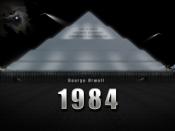George Orwell's Nineteen Eighty-four has been challenged on such grounds as profanity, immorality, and obscenity. It has been charged with being Communistic, containing sex references, and being depressing. Some of these charges are absurd, and though some have a grain of truth when items are taken out of context, on the whole the book stands up well and though frequently challenged has a history of rarely being removed from classrooms and libraries. Critics, as well as readers in general, have recognized the book as significant and valuable since its appearance at the end of the 1940s. Some examples: On the dust jacket of the first American edition of Nineteen Eighty-four Bertrand Russell and Alfred Kazin are quoted. Russell states, "Nineteen Eighty-four depicts the horrors of a well-established totalitarian regime of whatever type with great power and skill and force of imagination." He adds that it is important that we should be aware of these dangers.
Alfred Kazin characterizes the book as "an extraordinary experience . . . overwhelming in its keenness and prophetic power." He further comments: "I hardly know which to praise more--Orwell's insight into the fate of man under totalitarianism, or his compassion for him." Reasons for reading and teaching Nineteen Eighty-four continue today to be much the same as these critics gave four decades ago.
The book does express a mood of near but not complete despair. The mood is despair only if readers do not heed the warning of what will happen if we continue on some of our present courses. But we do not have to become soulless automatons. It is not foreordained. The scenario of Nineteen Eighty-four is that atomic wars had started in the 1940s, accelerated ten years later in Russia, Western Europe, and North America. This atomic war led the governments (Eurasia,



1984,George Orwell Why Nineteen Eighty-Four Should Be Read and Taught
Great essay. The author maintains his or her focus throughout the entire piece. I recomend this essay for anyone in need of insight regarding the importance of 1984.
4 out of 4 people found this comment useful.